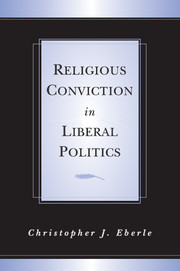Book contents
- Frontmatter
- Contents
- Acknowledgments
- PART ONE RELIGION AND RESTRAINT
- PART TWO WHY RESTRAINT?
- Introduction to Part Two
- 4 What Respect Requires
- 5 What Respect Does Not Require
- 6 Religion, War, and Division
- Concluding Comments on the Normative Case for Restraint
- PART THREE WHAT IS PUBLIC JUSTIFICATION?
- Concluding Comments
- Notes
- Index
6 - Religion, War, and Division
Published online by Cambridge University Press: 18 December 2009
- Frontmatter
- Contents
- Acknowledgments
- PART ONE RELIGION AND RESTRAINT
- PART TWO WHY RESTRAINT?
- Introduction to Part Two
- 4 What Respect Requires
- 5 What Respect Does Not Require
- 6 Religion, War, and Division
- Concluding Comments on the Normative Case for Restraint
- PART THREE WHAT IS PUBLIC JUSTIFICATION?
- Concluding Comments
- Notes
- Index
Summary
INTRODUCTION
The argument from respect has a decidedly deontological tone: although the justificatory liberal expects obedience to the doctrine of restraint to have all manner of salutary effects – facilitating harmonious relations among diversely committed citizens, for example – the argument from respect doesn't depend for its soundness on any such claim about consequences. Given the demise of the argument from respect, then, perhaps a consequentialist rationale for the doctrine of restraint has a better chance of carrying the day. More particularly, perhaps the justificatory liberal would do well to articulate a consequentialist argument in support of the claim that citizens should exercise restraint with respect to their religious commitments.
In fact, some justificatory liberals take just that tack. An important argument for the doctrine of restraint, as Rorty puts it, is “historical, not philosophical.” Rather than adverting to abstract analyses of what respect requires, the justificatory liberal appeals to certain salient facts from the history of religion. History teaches us that when religion intrudes upon politics all manner of calamities ensue: the Crusades, the Wars of the Schmalkaldic League, the French Civil Wars – most particularly the St. Bartholomew's Day Massacre, the Swedish Civil War, the Thirty Years' War, the English Civil War, the Inquisition, the Conquest of the Aztecs and Incas, the Salem Witch Trials, the Bosnia conflict, perhaps even the Second World War.
- Type
- Chapter
- Information
- Religious Conviction in Liberal Politics , pp. 152 - 186Publisher: Cambridge University PressPrint publication year: 2002



